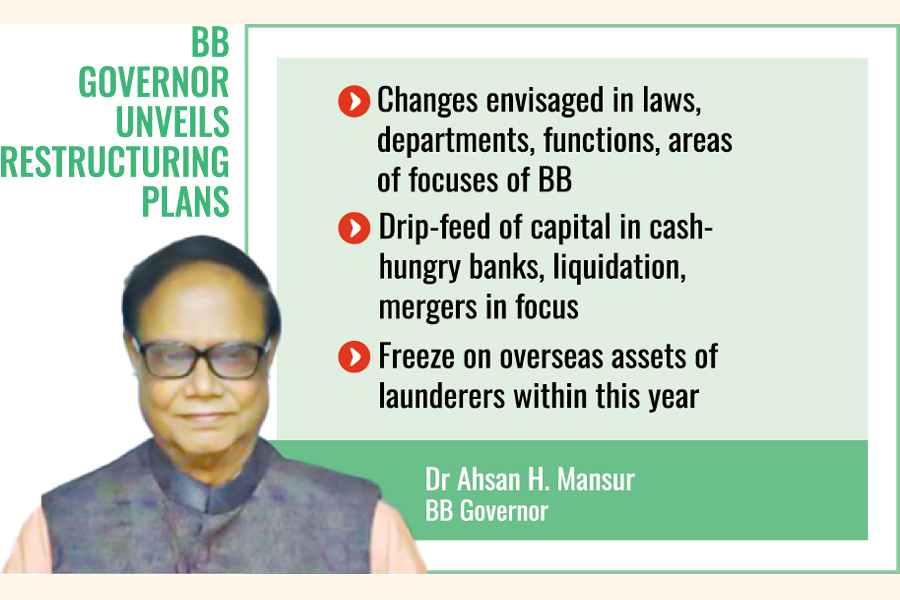
Published :
Updated :

Bangladesh Bank will submit a package proposal for transforming the central bank into a fully autonomous body within four months to the head of interim government, as part of full-course reforms in the banking sector Bangladesh Bank Governor Dr Ahsan H. Mansur unveiled the plans, including a new law in the making, while speaking as the chief guest at a discussion Thursday in Dhaka.
He said the chief adviser of the interim government gave the green signal for the upcoming reforms in the banking regulator.
Under the plan, he said, the central bank will bring necessary changes in laws, departments, functions and areas of focuses in the days ahead to make it a modern central bank.
"We want to reshape focus of the BB. We'll leave the activities that are not core central banking. We'll give utmost priority to issues linked with compliance, regulations and enforcement," Mr Mansur, who took charge as the governor shortly after the changeover in state power in the recent mass uprising, told the economic reporters.
He said they want to transform the central bank into a completely autonomous institution that will not be influenced by government machinery-an implicit reference to what happened in the past and its consequences.
Economic Reporters' Forum (ERF) organised the discussion on 'Bangladesh's Macroeconomic Landscape: Challenges in the Banking Sector and Path Ahead'.
Distinguished fellow of the policy think-tank CPD Professor Dr Mustafizur Rahman and Managing Director and Chief Executive Officer of Pubali Bank PLC Mohammad Ali also spoke at the event that was chaired by ERF president Doulot Akter Mala.
Regarding sustainable remedy for the liquidity crisis-ridden commercial banks, the BB governor said they plan to recapitalise the poorly performing banks through protecting cent-percent interests of the depositors.
They have completed the draft of a law titled Bank Resolution Act, which is now in the vetting stage, which will have all the remedial options like liquidation, mergers and recapitalisation.
"The recapitalisation process will be done slowly in several years intensifying focus on deposit buildup. We want to follow the recapitalisation process that helped strengthen once-struggling banks like Eastern Bank, Pubali Bank and City Bank," the governor said.
About asset recovery, the governor said countries like Nigeria and Angola got success in recovering the stolen assets. "If they became successful, why won't we?"
They are getting cooperation from the foreigners who are now giving the central bankers necessary training in dealing with such cases in globally-recognised ways.
It normally takes five years to bring back laundered money. "I don't know how much we will do in a short period of time. We can maximum ensure freeze of overseas assets of the launderers within this year. But the next elected government needs to continue the process to get desired outcomes."
Terming the higher-inflation regime one of the major challenges facing the economy, CPD distinguished fellow Prof Dr Mustafizur Rahman said the government needs to create investment-friendly atmosphere apart from containing inflation.
Stressing the importance of bringing necessary reforms in the NBR (National Board of Revenue), he said, "Unless the revenue board is properly reshaped, the pressure on the banking industry will not be eased."
Banker Mohammad Ali said the ratio of NPL (non-performing loan) in their Pubali Bank was 54 per cent in 1984. In 2005, the bank came out of the tag of weak bank and the regulator lifted administrator in two years thereafter.
"Now, it (Pubali) is one of the leading banks in all indicators riding on the sound corporate governance that it maintains over the years," he told the meet.
The experienced banker suggests the struggling banks will be able to come out of the current situation if they give serious attention to ensuring corporate governance.
jubairfe1980@gmail.com


 For all latest news, follow The Financial Express Google News channel.
For all latest news, follow The Financial Express Google News channel.